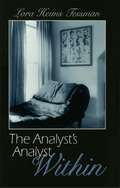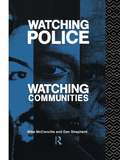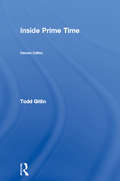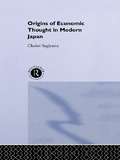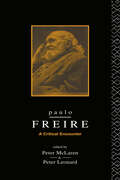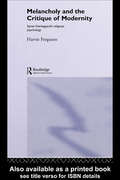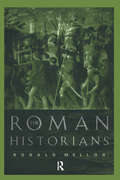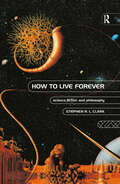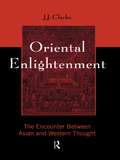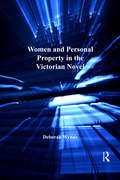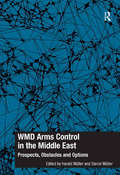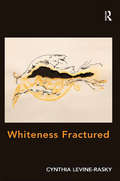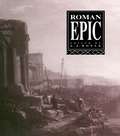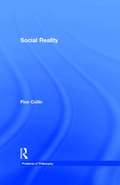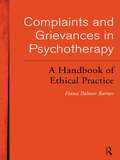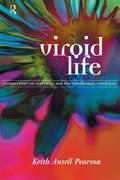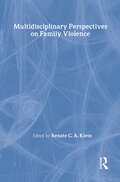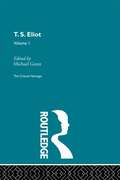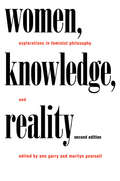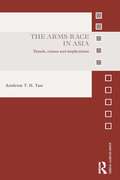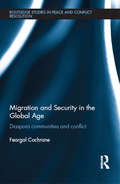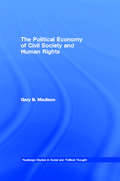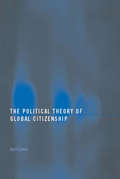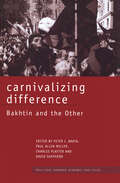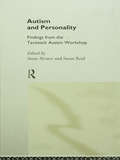Special Collections
Benetech’s Global Certified Accessible Titles
Description: Benetech’s GCA program is the first independent third-party EPUB certification to verify ebook accessibility. By creating content that is born accessible, publishers can meet the needs of all readers. Learn more: https://bornaccessible.benetech.org/
- Table View
- List View
The Analyst's Analyst Within
by Lora H. TessmanThe Analyst's Analyst Within is the most illuminating study to date of how psychoanalysts' experiences with their own analysts affect their lives, their loves, and their evolving professional identities. A gifted interviewer with equally gifted interview subjects, Tessman samples different gender combinations and age ranges in showing how the values typifying different eras of psychoanalytic theorizing enter into the meaning and impact of training analyses. Tessman's findings are striking, and they do not end with her discovery of startling differences according to the decade during which a training analysis took place. She also found that neither the theoretical orientation of the training analyst nor his or her technical preferences predicted whether, years later, the analysis would be remembered as satisfying or dissatisfying, as growth promoting or thwarting. Rather, it was the quality of affective engagement that became reliably present, with the figure of the training analyst, inscribed in all his or her particularity, accounting for the perceived sense of a truly productive analytic experience. Tessman's research program, which encompasses her methodology, her skill as an interviewer, and the wisdom and clarity of thought of her participants, lifts this work well beyond the perfunctory debates about psychoanalytic training that recur in the journal literature. The power of The Analyst's Analyst Within resides in compelling individual narratives in which analysts revisit their own treatment past - and the analyst within - with candor, vividness, and often great poignancy. The result is a book that not only supersedes previous studies of the training analysis but also opens a new vista on how and why analysis works when it works and fails when it fails.
Watching Police, Watching Communities
by Mike McConville and Dan ShepherdFrom the early 80s community policing has been held up as a new commitment to the ideals of service and the rejection of coercive policing styles. The idea was to encourage a partnership between the public and police in which community needs would be met by officers on local beats. Today, Government ministers and senior police officers depict Neighbourhood Watch, the centrepiece of the scheme, as a great success. However, Watching Police, Watching Communities reveals that most schemes are dormant or dead. The authors trace the causes of scheme failure to the lack of commitment to community policing by police forces. Most importantly, they find a police rank-and-file culture which celebrates aggression, machismo and the assertion of authority especially against areas occupied by ethnic minorities and other disadvantaged groups.
Inside Prime Time
by Todd GitlinPrime time: those precious few hours every night when the three major television networks garner millions of dollars while tens of millions of Americans tune in. Inside Prime Time is a classic study of the workings of the Hollywood television industry, newly available with an updated introduction. Inside Prime Time takes us behind the scenes to reveal how prime-time shows get on the air, stay on the air, and are shaped by the political and cultural climate of their times. It provides an ethnography of the world of American commercial television, an analysis of that world's unwritten rules, and the most extensive study of the industry ever made.
The Origins of Economic Thought in Modern Japan
by Chuhei SugiyamaBy throwing light on economic thought in the period of the Japanese Enlightenment, this book will make clear what led to the institutionalization of business and economic education, the birth of the pioneer business enterprise and of serious economic journalism and the reasons behind the success of Japanese economic development.
Paulo Freire
by Peter Leonard and Peter McLarenPaulo Freire is one of the century's great thinkers on education and the politics of liberation. Known mostly for his literacy campaigns in Latin America and Africa, and for his seminal work Pedagogy of the Oppressed, his thinking continues to be rediscovered by generations of teachers, scholars, community activists and cultural workers in Europe and North America. While his name is synonymous with the practice of Critical Literacy' and A Pedagogy of Liberation', his work has been appropiated in many diverse fields of discipline and site-based projects of social reform. This volume represents a pathfinding analysis of Freires work and in many cases it offers an extension of his thinking in order to make it more applicable to first world contexts. Peter McLaren and Peter Leonard have brought together a divergent group of scholars widely recognized for their contributions to critical theory and critical pedagogy. Themes addressed include Freier's relation to feminist critique, his philosophical roots and an evaluation of his ideas from postmodernist and postcolonialist perspectives. The collection will be essential reading for anyone interested in the radical sociology of education and the politics of liberation.
Melancholy and the Critique of Modernity
by Harvie FergusonThe connections between the emergence of modern society and the experience of melancholy are explored through a comprehensive re-examination of Soren Kierkegaard's rich and insightful writings.
The Roman Historians
by Ronald MellorThe Romans' devotion to their past pervades almost every aspect of their culture. But the clearest image of how the Romans wished to interpret their past is found in their historical writings. This book examines in detail the major Roman historians:* Sallust* Livy* Tacitus* Ammianusas well as the biographies written by:* Nepos* Tacitus* Suetonius* the Augustan History* the autobiographies of Julius Caesar and the Emperor Augustus.Ronald Mellor demonstrates that Roman historical writing was regarded by its authors as a literary not a scholarly exercise, and how it must be evaluated in that context. He shows that history writing reflected the political structures of ancient Rome under the different regimes.
How to Live Forever
by Stephen R ClarkImmortality is a subject which has long been explored and imagined by science fiction writers. In his intriguing new study, Stephen R.L.Clark argues that the genre of science fiction writing allows investigation of philosophical questions about immortality without the constraints of academic philosophy. He reveals how fantasy accounts of issues such as resurrection, disembodied survival, reincarnation and devices or drugs for preserving life can be used as an important resource for philosophical inquiry and examines how a society of immortals might function through a reading of the vampire myth. How to Live Forever is a compelling study which introduces students and professional philosophers to the possibilities of using science fiction in their work. It includes extensive suggestions for further reading, both fictional and philosophical, and examines the work of such major science fiction authors as Arthur C. Clarke, Frank Herbert, Larry Niven, William Gibson, and Colin Wilson.
Oriental Enlightenment
by J.J. ClarkeWhat is the place of Eastern thought - Buddhism, Taoism, Hinduism, Confucianism - in the Western intellectual tradition? Oriental Enlightenment shows how, despite current talk of 'globalization', there is still a reluctance to accept that the West could have borrowed anything of significance from the East, and explores a critique of the 'orientalist' view that we must regard any study of the East through the lens of Western colonialism and domination.Oriental Enlightenment provides a lucid introduction to the fascination Eastern thought has exerted on Western minds since the Renaissance.
Women and Personal Property in the Victorian Novel
by Deborah WynneHow key changes to the married women's property laws contributed to new ways of viewing women in society are revealed in Deborah Wynne's study of literary representations of women and portable property during the period 1850 to 1900. While critical explorations of Victorian women's connections to the material world have tended to focus on their relationships to commodity culture, Wynne argues that modern paradigms of consumerism cannot be applied across the board to the Victorian period. Until the passing of the 1882 Married Women's Property Act, many women lacked full property rights; evidence suggests that, for women, objects often functioned not as disposable consumer products but as cherished personal property. Focusing particularly on representations of women and material culture in Charles Dickens, George Eliot, and Henry James, Wynne shows how novelists engaged with the vexed question of women's relationships to property. Suggesting that many of the apparently insignificant items that 'clutter' the Victorian realist novel take on new meaning when viewed through the lens of women's access to material culture and the vagaries of property law, her study opens up new possibilities for interpreting female characters in Victorian fiction and reveals the complex work of 'thing culture' in literary texts.
WMD Arms Control in the Middle East
by Harald MüllerThe Middle East is a hot spot of proliferation. It contains one state assumed to possess nuclear weapons, several states that tried and failed to develop a military nuclear capability, one state under suspicion of trying to do so, and it is the world region that witnessed the most frequent and severe employment of chemical weapons since the end of World War I. Notwithstanding, not a single arms control regime concerning weapons of mass destruction (WMD) covers the region as a whole. Instead we have seen several proliferation-related military operations which have rather contributed to destabilization than served non-proliferation. This volume, written under the auspices of the EU Consortium for Non-Proliferation and Disarmament determines the current state of diplomatic efforts to establish a WMD free zone in the Middle East. In doing so, it provides insights into central actors’ conflicting political positions, thereby explaining the stalemate of efforts to negotiate a WMD-free zone. Chapters written by renowned experts from academia and policy-oriented think tanks, as well as by next-generation Middle East and arms control experts, introduce the subject to the reader, give background information about arms control initiatives, provide technical expertise, and endeavour to make proposals for arms control measures in support of the creation of a Middle East WMD-free zone.
Whiteness Fractured
by Cynthia Levine-RaskyWhiteness Fractured examines the many ways in which whiteness is conceptualized today and how it is understood to operate and to effect social relationships. Exploring the intersections between whiteness, social class, ethnicity and psychosocial phenomena, this book is framed by the question of how whiteness works and what it does. With attention to central concepts and the history of whiteness, it explains the four ways in which whiteness works. In its examination of the outward and inward fractures of whiteness, the book sheds light on both its connections with social class and ethnicity and with the 'epistemology of ignorance' and the psychoanalytic. Representing the long career of whiteness on the one hand and investigating its expansion into new areas on the other, Whiteness Fractured reflects the growing maturity of critical whiteness studies. It undertakes a critical analysis of approaches to whiteness and proposes new directions for future action and enquiry. As such, it will appeal to scholars across the social sciences with interests in race and ethnicity, intersectionality, colonialism and post-colonialism, and cultural studies.
Roman Epic
by A. J. BoyleRoman epic is both index and critique of the foundational culture of the western world. It is one of Europe's most persistent and determinant poetic modes. In this book distinguished Latinists examine the formation and evolution of Roman epic from its beginnings in the third century BC to the high Italian Renaissance. Featuring a variety of methodologies and approaches, it clarifies the literary importance and political and moral meaning of Roman epic.
Social Reality
by Finn CollinSocial reality is currently a hotly debated topic not only in social science, but also in philosophy and the other humanities. Finn Collin, in this concise guide, asks if social reality is created by the way social agents conceive of it? Is there a difference between the kind of existence attributed to social and to physical facts - do physical facts enjoy a more independent existence? To what extent is social reality a matter of social convention. Finn Collin considers a number of traditional doctrines which support the constructivist position that social reality is generated by our 'interpretation' of it. He also examines the way social facts are contingent upon the meaning invested in them by social agents; the nature of social convention; the status of social facts as symbolic; the ways in which socially shared language is claimed to generate the reality described, as well as the limitations of some of the over-ambitious popular arguments for social constructivism.
Complaints and Grievances in Psychotherapy
by Fiona Palmer Barnes and Fiona Palmer BarnesWhat is good practice when handling a complaint? What is the ethical basis of such practice? Fiona Palmer-Barnes pays equal attention to both these issues which are essential for psychotherapists and counsellors practising today. Drawing on her considerable experience of managing complaints for both the British Association for Counselling and the United Kingdom Council for Psychotherapy, she delineates the basics for putting in place a professional and ethical system of investigation and action. Illustrated by case examples, the handbook covers all aspects of complaints and grievance management: * competence * contract * confidentiality * mistakes or malpractice * principles for dealing with complaints * investigation * adjudication * sanctions * outcomes * appeals It includes useful addresses, current codes of ethics from major umbrella organizations, protocols and sample letters.
Viroid Life
by Keith Ansell PearsonNietzsche's vision of the 'overman' continues to haunt the postmodern imagination. His call that 'man is something that must be overcome' can no longer be seen as simple rhetoric. Our experiences of the hybrid realities of artificial life have made the 'transhuman' a figure that looks over us all. Inspired by this vision, Keith Ansell Pearson sets out to examine if evolution is 'out of control' and machines are taking over.In a series of six fascinating perspectives, he links Nietzsche's thought with the issues at stake in contemporary conceptions of evolution from the biological to the technological. Viroid Life; Perspectives on Nietzsche and the Transhuman Condition considers the hybrid, 'inhuman' character of our future with the aid of Nietzsche's philosophy. Keith Ansell Pearson contrasts Nietzsche and Darwin before introducing the more recent figures such as Giles Deleuze and Guy Debord to sketch a new thinking of technics and machines and stress the ambiguous character of our 'machine enslavement'.
Multidisciplinary Perspectives on Family Violence
by Renate C.A.KleinThis book presents a wide range of issues pertaining to conflict and violence in close, personal relationships. It crosses disciplinary and national boundaries by presenting the work of scholars in psychology, family studies, anthropology, women's studies, sociology and legal philosophy who come from Denmark, France, Germany, Britain, Greece, Poland, Spain and The Netherlands to provide a range of geographical, cultural and historical backgrounds. In association with the International Society for the Study of Personal Relationships.
T.S. Eliot Volume I
by Michael GrantThis set comprises 40 volumes covering nineteenth and twentieth century European and American authors. These volumes will be available as a complete set, mini boxed sets (by theme) or as individual volumes. This second set compliments the first 68 volume set of Critical Heritage published by Routledge in October 1995.
Women, Knowledge, and Reality
by Ann Garry and Marilyn PearsallThis second edition of Women, Knowledge, and Reality continues to exhibit the ways in which feminist philosophers enrich and challenge philosophy. Essays by twenty-five feminist philosophers, seventeen of them new to the second edition, address fundamental issues in philosophical and feminist methods, metaphysics, epistemology, and the philosophies of science, language, religion and mind/body. This second edition expands the perspectives of women of color, of postmodernism and French feminism, and focuses on the most recent controversies in feminist theory and philosophy. The chapters are organized by traditional fields of philosophy, and include introductions which contrast the ideas of feminist thinkers with traditional philosophers. The collected essays illustrate both the depth and breadth of feminist critiques and the range of contemporary feminist theoretical perspectives.
The Arms Race in Asia
by Andrew T.H. TanThis book is the first systematic examination of the emerging arms race in Asia. The global trade in arms is to a large degree underpinned by the strong demand for arms in Asia and the Middle East, the two largest arms export markets in the world. Of these two regions Asia has become particularly significant, led by the emergence of China and India as major powers. It is therefore not surprising that the rapid military modernisation in Asia, accompanied by significant increases in the size and sophistication of armed forces, has generated attention as to its trends, key characteristics, causes and implications. This phenomenon, which has become evident since the end of the Cold War, has also been widely described as an Asian 'arms race'. This book evaluates the key conceptual ideas which can shed light on this phenomenon, as well as examining the complex mix of internal, external and technological factors that have led to its emergence. The volume explores the way in which the arms race is leading ultimately to three distinctive blocs in the emerging geostrategic landscape: a loose bloc of US allies in the region; a counter-bloc of potential US adversaries; and a neutral bloc of states with industrial age armed forces whose allegiances will vary according to circumstances and geostrategic developments. The Arms Race in Asia concludes that if the emerging arms race is left unchecked, it is likely that Asia will increasingly become a region of instability, marked by conflicts and interstate wars. The book will be of great interest to students of Asian politics, strategic studies, defence studies, security studies and IR in general.
Migration and Security in the Global Age
by Feargal CochraneThis book is an interdisciplinary examination of several interconnecting aspects of migrant communities in the context of contemporary conflict and security. The book illustrates that within this globalised world, migrants have become key actors, living in the spaces between states, as well as within them. Arguing that migrants and their descendants are vital and complex constituencies for the achievement of security in this global age, the volume uses a number of case studies, including Palestinian, Sri Lankan, Irish and Somali diaspora communities, to explore the different ways that such groups intersect with issues of security, and how these attitudes and behaviours have evolved in the context of political transnationalism and the global economy. Comparative and econometric studies of migration can provide a wide lens but at times fail to capture the depth and complexity of these communities and attitudes within them. At the same time, empirically focused studies are often case-specific and, while rich in local detail, lack comparative breadth or the ability to make connections and see irregularities across a number of contexts that might be of interest to scholars beyond that specific area. This book connects these literatures together more thoroughly. In particular, it demonstrates that political, cultural, economic and social factors all play important roles in helping us understand the actual (and potential) roles of migrant communities in conflict and the establishment of sustainable security within contemporary society. Lastly, given this context, the book seeks to examine the challenges and opportunities that exist, for such a sustainable security strategy to be developed. This book will be of much interest to students of migration and diaspora communities, peace and conflict studies, security studies and ethnic conflict.
The Political Economy of Civil Society and Human Rights
by Gary B. MadisonMadison uses the concept of civil society and his distinctive version of 'communicative rationality' to provide a closely-argued and robust defence of the neo-liberal political and economic tradition. Writing with considerable elegance and humour, the author draws on the hermeneutical and neo-pragmatist traditions, and on a diverse range of evidence and discussion, mainly concerning transitional economies and societies in Eastern Europe and around the world. Providing a systematic analysis of the multi-faceted notion of civil society, this book shows in detail how the three main orders of civil society - the moral-cultural, the political, and the economic - constitute 'spheres of autonomy'. At the same time, it illustrates how these different orders are closely interrelated and interact in a synergetic manner. A unique feature of this study is the way in which the author demonstrates how the logic of the various orders of civil society is, in a way appropriate to the distinct nature of each order, a logic of communicative rationality. The work concludes by arguing that the only sure way of achieving international justice is by the construction of civil society world-wide.
The Political Theory of Global Citizenship
by April CarterThis book provides a comprehensive overview of the meaning of cosmopolitanism and world citizenship in the history of Western political thought, and in the evolution of international politics since 1500.Providing an invaluable overview of earlier political thought, recent theoretical literature and current debates, this book also discusses recent developments in international politics and transnational protest. It will be of great interest to those specialising in political theory, International Relations and peace/conflict studies. It will also interest those already acting as global citizens.
Carnivalizing Difference
by Paul Allen Miller and David Shepherd and Charles Platter and Peter I. BartaIt has seemed at times that there is no neutral territory between those who see Bakhtin as the practitioner of a kind of neo-Marxist, or at least materialist, deconstruction and those who look at the same texts and see a defender of traditional, liberal humanist values and classical conceptions of order, a conservative in the true sense of the term. Arising from a conference under the same title held at Texas Tech University, Carnivalizing Difference seeks to explore the actual and possible relationships between Bakhtinian theory and cultural practice. The introduction explores the changing configurations of our understanding of Bakhtin's work in the context of recent theory and outlines how that understanding can inform, and be informed by, culture both ancient and modern. Eleven articles, spanning a wide range of periods and cultural forms, then address these issues in detail, revealing the ways in which Bakhtinian thought illuminates, sometimes obfuscates, but always challenges.
Autism and Personality
by Susan Reid and Biddy Youell and Anne Alvarez and Judith EdwardsTaking a psychoanalytic and developmental approach, Autism and Personality outlines in considerable detail the new developments in therapeutic techniques used by the Tavistock Autism Team and Workshop to treat autistic children. It also underlines the importance of support for parents and siblings, who are all too often ignored under considerable stress. The book presents fresh ideas about the importance of personality for the developmental course of the condition, and the implications for psychotherapeutic technique. Using case vignettes to illustrate the theoretical ideas emerging from the Workshop, coupled with case studies which highlight the patient's changing contact with the therapist, it gives a fascinating picture of the individuality of each child and of the sensitivity and skill required for each treatment. Accessible to professionals and also to parents, Autism and Personality is a valuable insight into the nature and course of this condition and its treatment.
